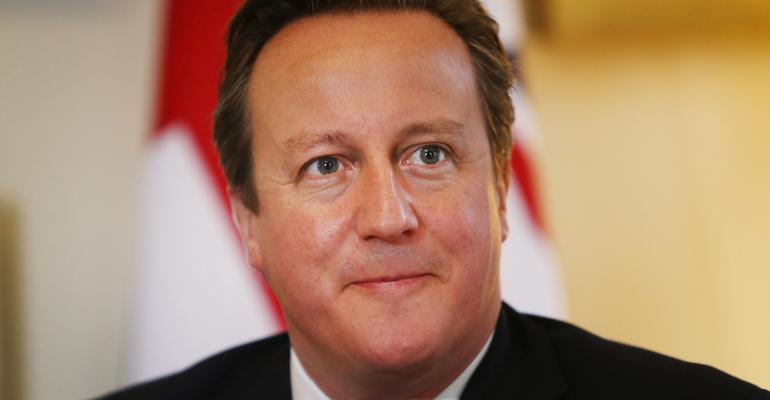(Bloomberg) -- U.K. Prime Minister David Cameron had a stake in an offshore fund set up by his late father, Ian, until six years ago, he said, answering for the first time the question of whether he ever benefited from the investment.
The premier has been under intense pressure to give details of his interests in the Blairmore Holdings Inc. fund since it was mentioned in reports that emerged Sunday following the leak of millions of documents from a Panamanian law firm detailing attempts to avoid tax. He previously only said that he, his wife Samantha and their children hold no offshore funds now and will not in the future.
“Samantha and I had a joint account,” Cameron said Thursday in an interview with ITV News. “We owned 5,000 units in Blairmore Investment Trust, which we sold in January 2010,” a few months before he became prime minister. The stake “was worth something like 30,000 pounds” ($42,000), he said. The couple made a profit, but it wasn’t enough to be subject to capital-gains tax, Cameron said, adding that income tax was paid on the dividends.
The furor over the fund has hit Cameron at a time when he’s fighting multiple crises, with his Conservative Party divided over whether or not Britain should stay in the European Union and doubts about the survival of the U.K. steel industry. After a bruising week in which U.K. media have picked over the Cameron family’s ties to the fund, the prime minister is trying to put the controversy to rest.
For the opposition Labour Party, it wasn’t enough, with deputy leader Tom Watson describing it as an “extraordinary admission from the prime minister.”
“Far from being the end of the matter, the questions keep coming,” Watson said in a statement. “Given that he claimed that ‘sunlight is the best disinfectant,’ why has it taken six years for this to come to light?”
‘Fundamental Misconception’
Cameron’s admission follows four separate statements about his financial affairs in which he first said it was a “private matter” and then said neither he nor or his wife and children benefit or stand to benefit from the fund. That left reporters asking about whether he had benefited in the past.
“As ever, if you come out with a statement that only covers half the ground, then journalists, being not stupid, try to chase it further,” John Curtice, professor of politics at Strathclyde University, said by phone. “And once you force a politician to make a second statement, and therefore you’ve got them to cover some ground, you push.”
The prime minister said he thought a lot of the criticism against him was based on “a fundamental misconception” that the unit trust was established with the idea of avoiding tax. “It wasn’t,” he said. “I think it is being unfairly described and my father’s name is being unfairly written about.”
The Guardian newspaper reported earlier this week that Blairmore had paid no U.K. tax on its profits for three decades.
‘My Dad’
“It has been a difficult few days, reading criticisms of my father and his business practices -- my dad, a man I love and admire and miss every day,” the prime minister said in the interview, conducted in Exeter, southwest England. “I can’t bear to see his name being dragged through the mud.”
Cameron said the fund was properly audited every year and reported to the U.K. tax authorities.
“If you were a U.K. citizen and bought units in it, then you paid income tax on the dividends and you paid capital-gains tax when you sold the shares,” he told ITV. “It was subject to full U.K. taxation.”
The prime minister said that his financial affairs are “very transparent” and he’s willing to make them more so. “Frankly I don’t have anything to hide,” he said. All stocks and shares that he had were sold in 2010, he said, “because if I was going to become prime minister, I didn’t want anyone to say ‘you have other agendas, vested interests.’”
Cameron’s father left him 300,000 pounds, he said, some of which came from another unit trust in the Channel Island of Jersey. “I obviously can’t point to every source of every bit of the money, and dad isn’t around to ask the questions now,” he said.





